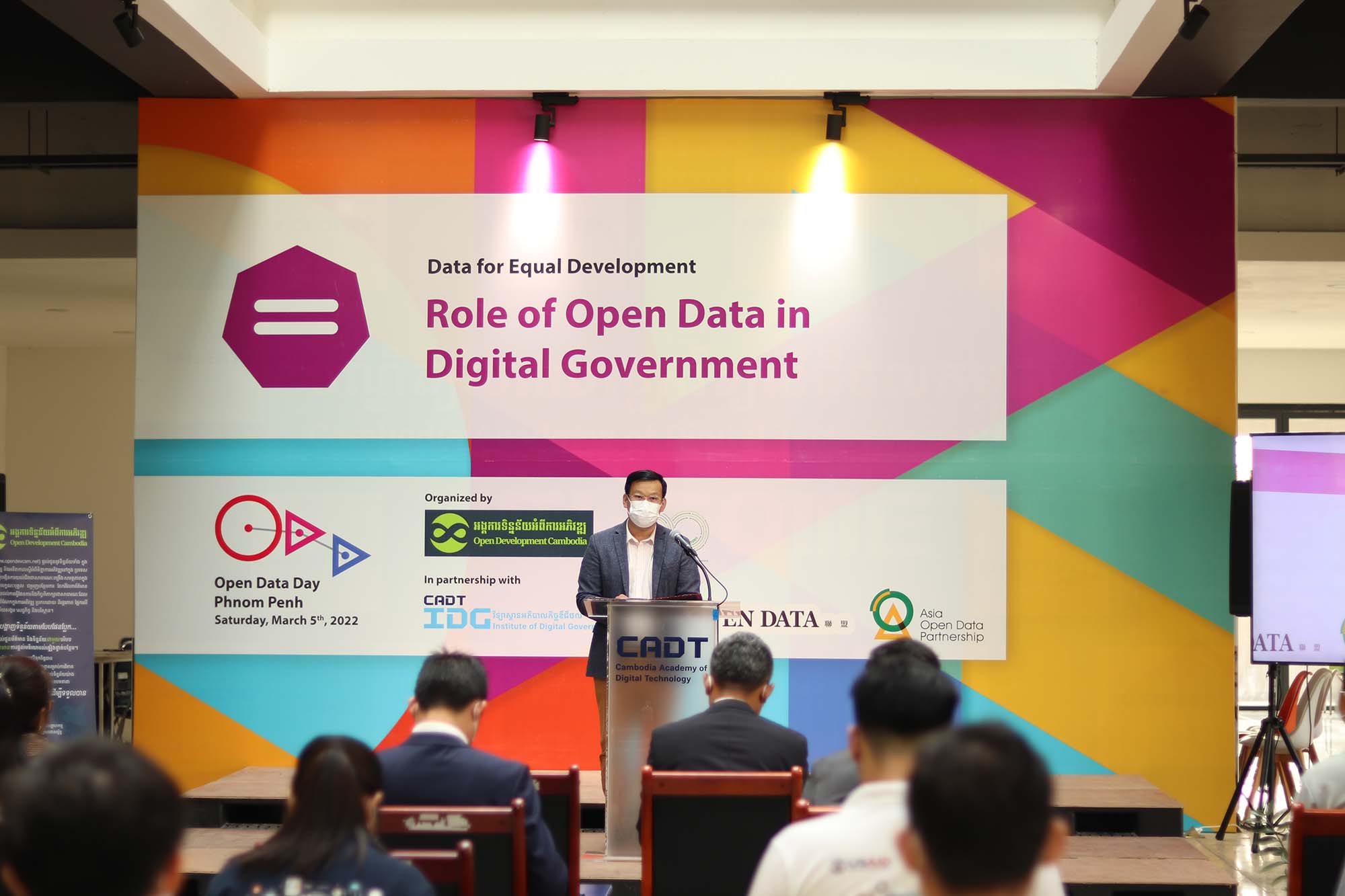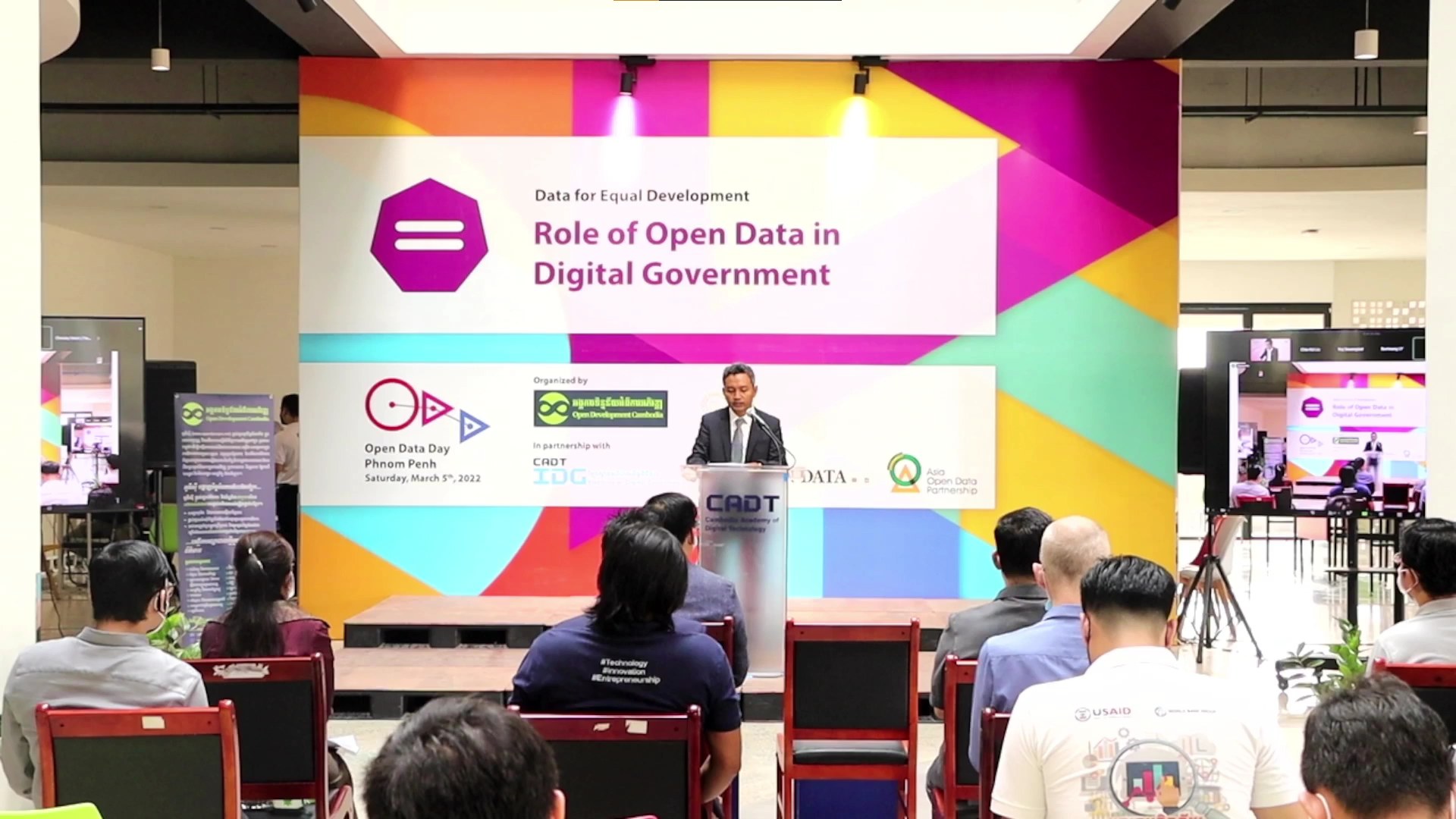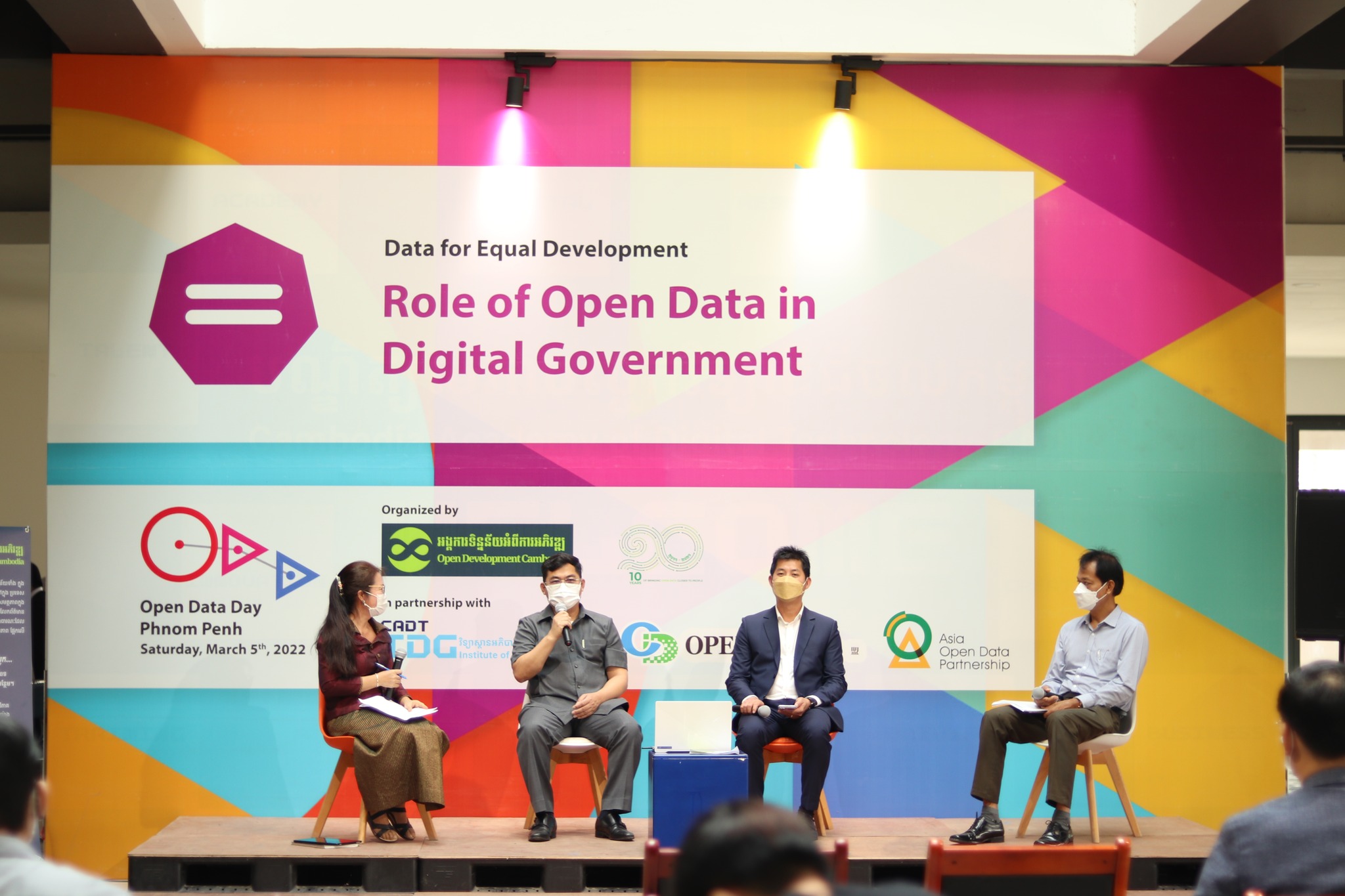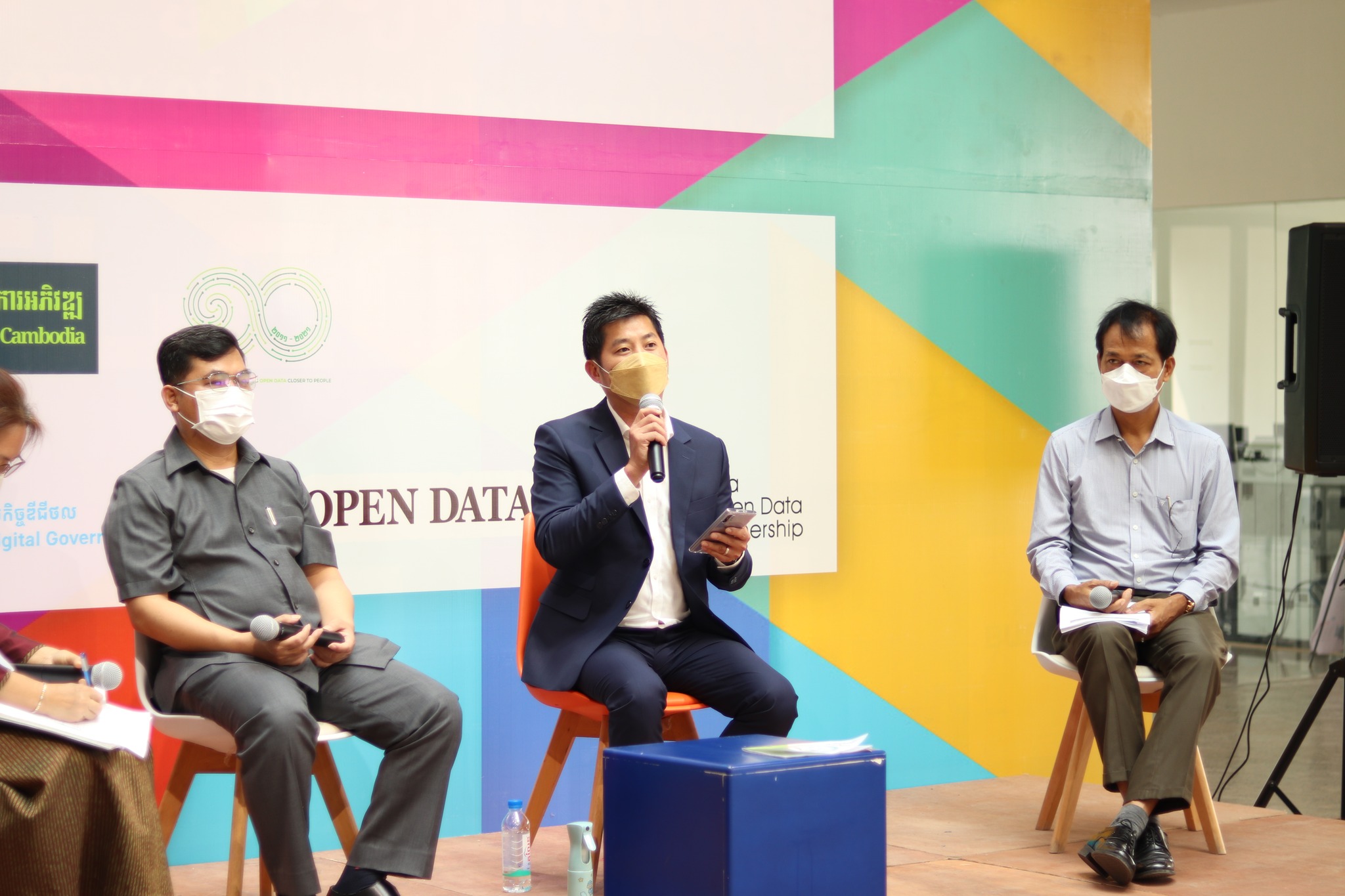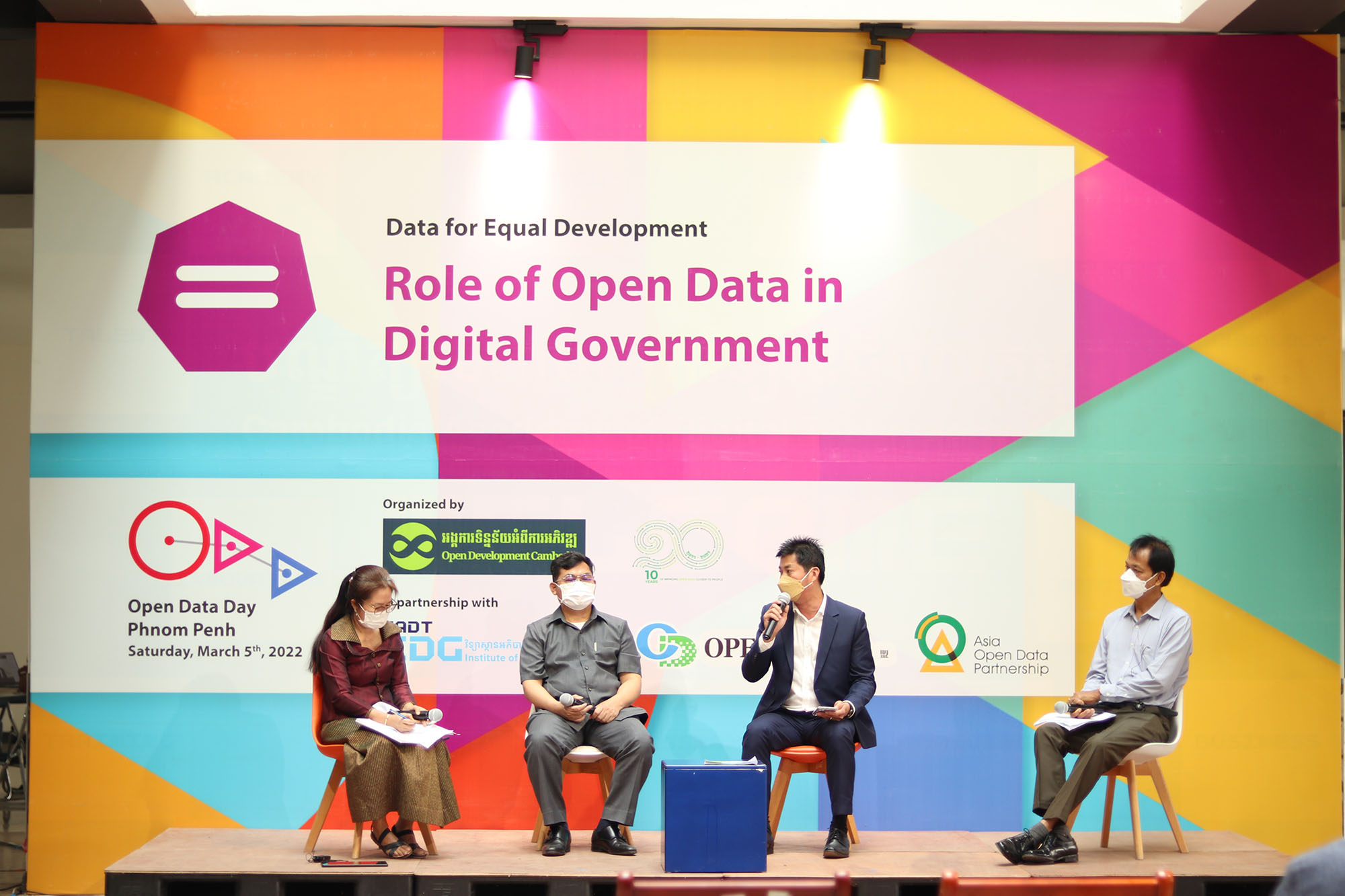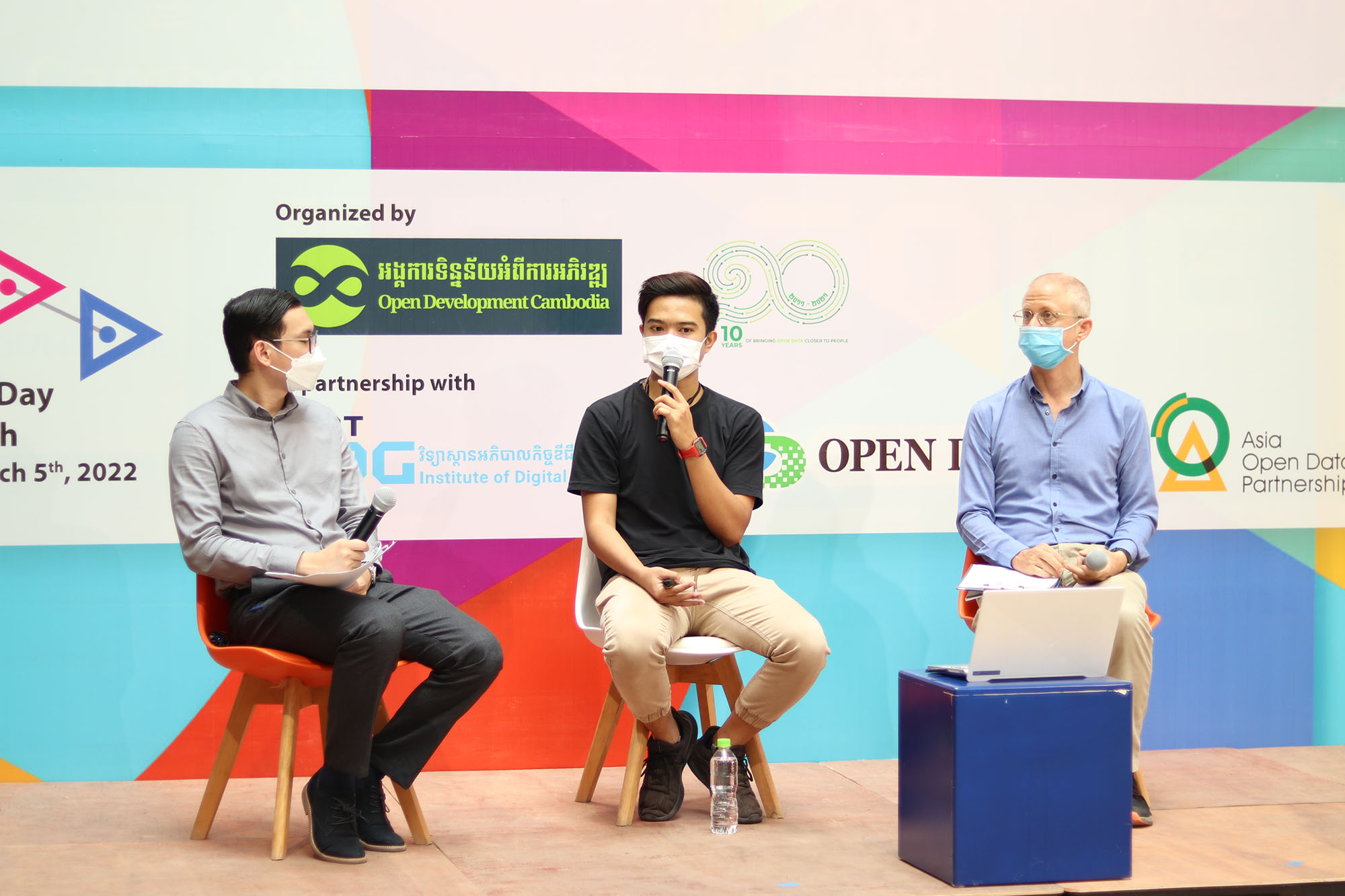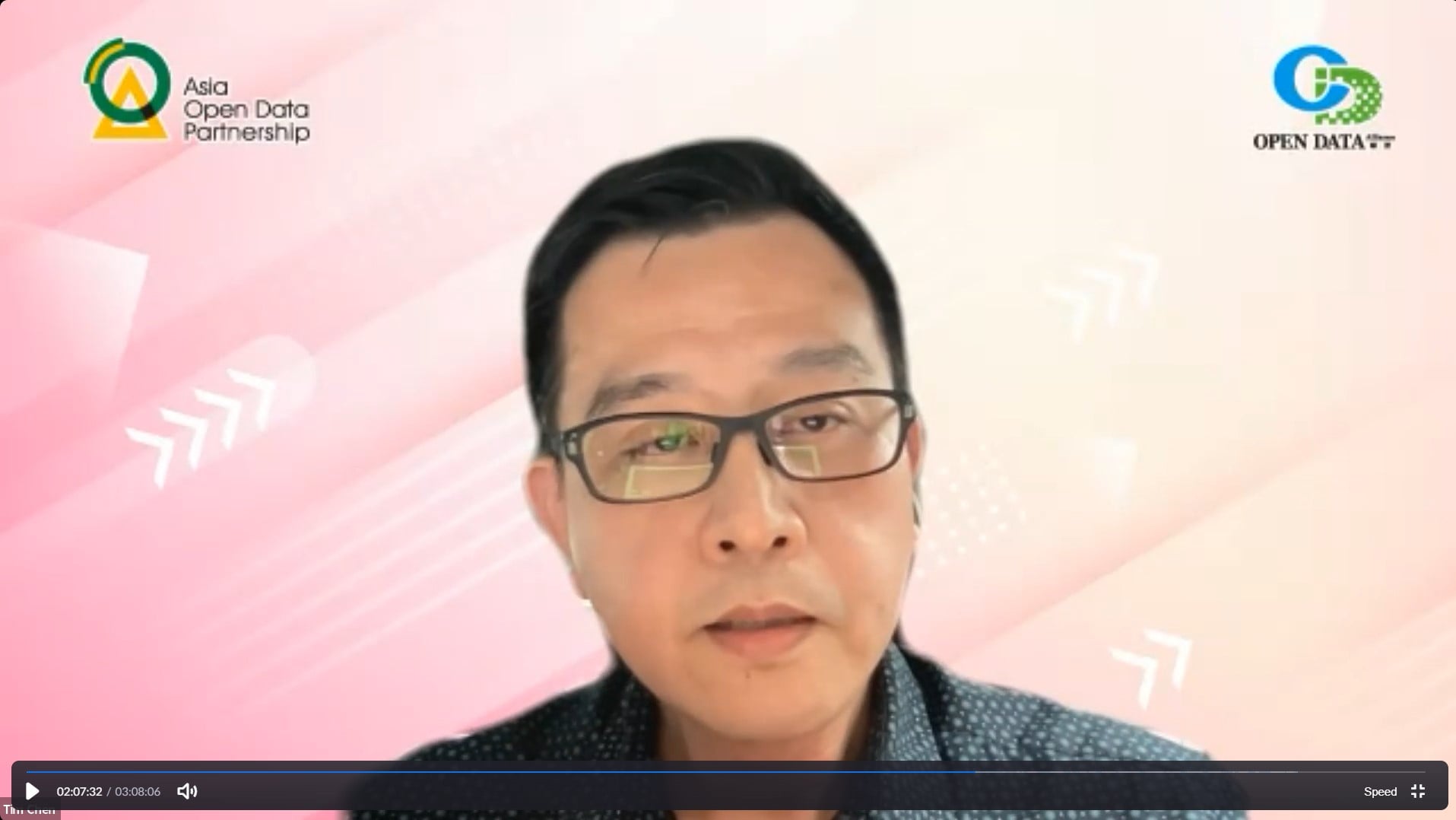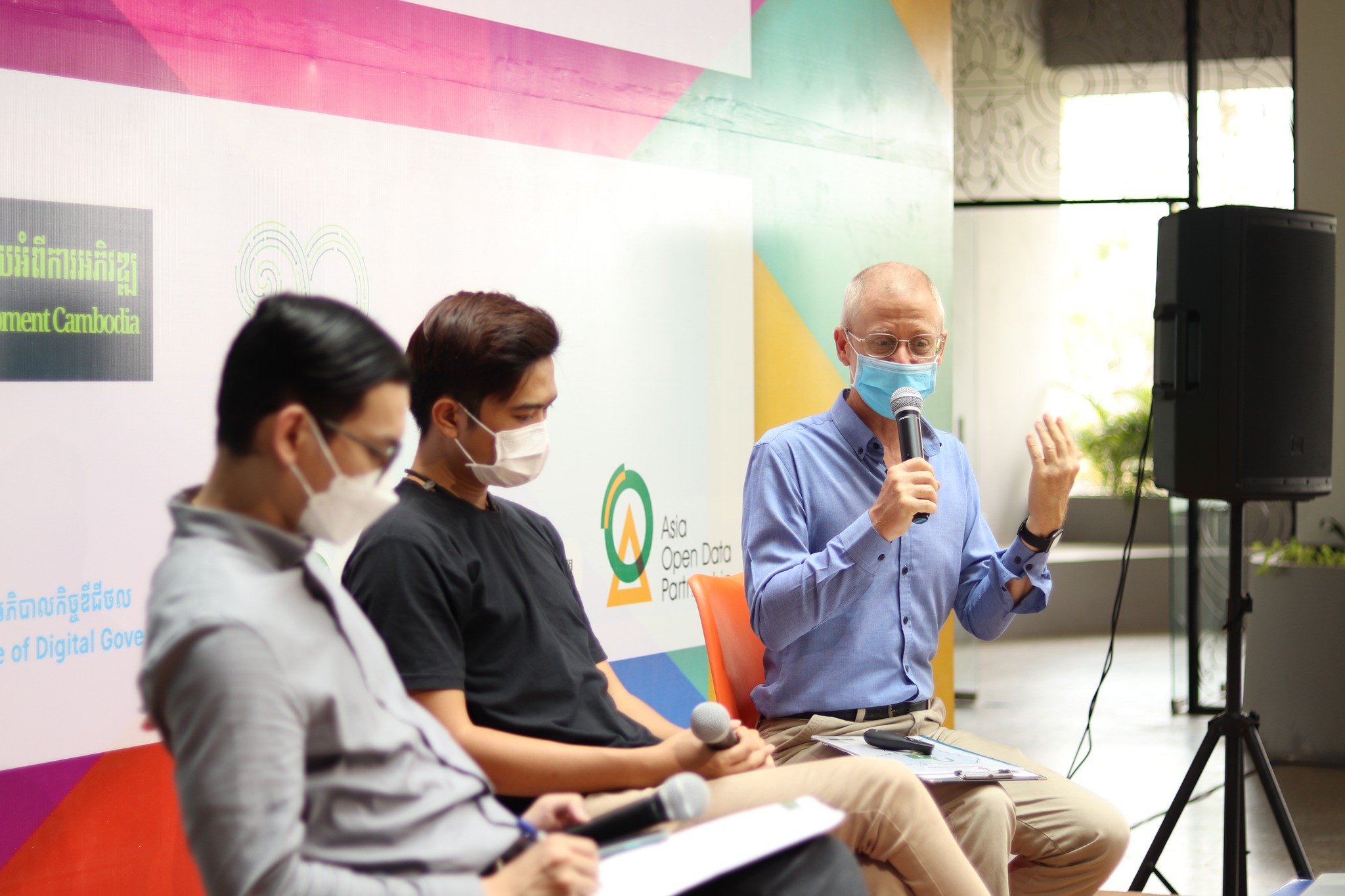ទិវាទិន្នន័យបើកទូលាយ ២០២២៖ តួនាទីនៃទិន្នន័យបើកទូលាយក្នុងការលើកកម្ពស់រដ្ឋាភិបាលឌីជីថល
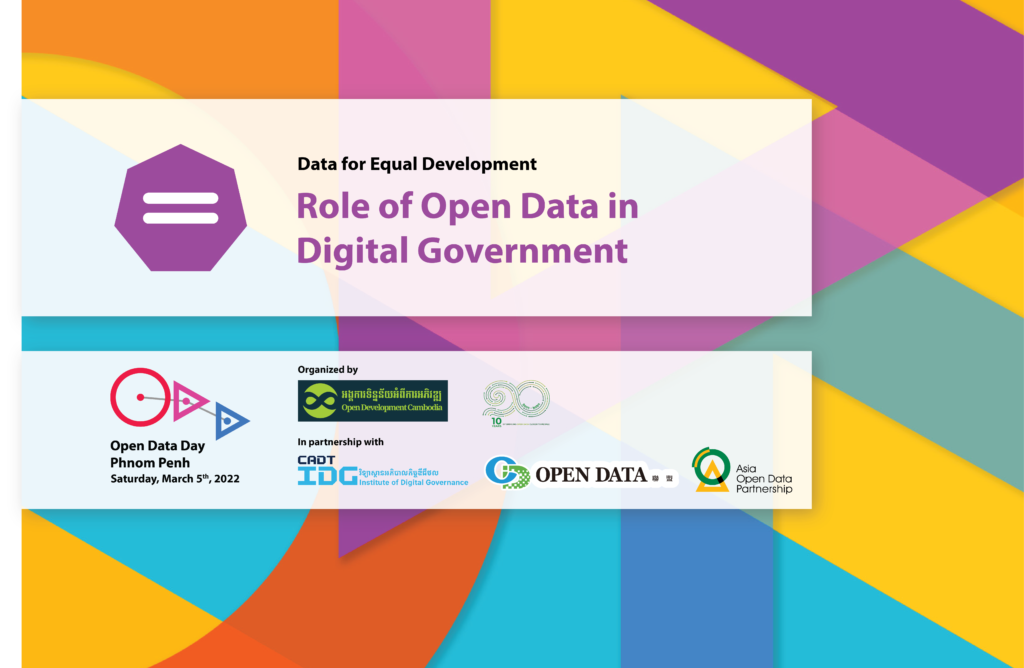
នៅថ្ងៃទី ៥ ខែមីនា ឆ្នាំ ២០២២ អង្គការទិន្នន័យអំពីការអភិវឌ្ឈ (ODC) ដោយសហការជាមួយ វិទ្យាស្ថានអភិបាលកិច្ចឌីជីថល នៃបណ្ឌិតសភាបច្ចេកវិទ្យាឌីជីថលកម្ពុជា (CADT) មានសេចក្តីសោមនស្សរីករាយក្នុងការប្រារព្ធទិវាទិន្នន័យបើកទូលាយ ២០២២ នៅ CADT ក្នុងរាជធានីភ្នំពេញ។ នេះជាឆ្នាំទី ៨ ជាប់គ្នាហើយដែលអង្គការ ODC បានប្រារព្ធព្រឹត្តិការណ៍អន្តរជាតិនេះដោយជោគជ័យ។ ទិវាទិន្នន័យបើកទូលាយអន្តរជាតិ គឺជាការប្រារព្ធពិធីជាសាកលដែលធ្វើឡើងជារៀងរាល់ឆ្នាំក្នុងគោលបំណងលើកកម្ពស់ការយល់ដឹង និងលើកទឹកចិត្តដល់ការប្រើប្រាស់ទិន្នន័យបើកទូលាយ។ ក្រុមអ្នកចូលចិត្តទិន្នន័យបើកទូលាយ និងអ្នកគាំទ្រជុំវិញពិភពលោកបានរៀបចំព្រឹត្តិការណ៍នៅតាមមូលដ្ឋាន ដើម្បីផ្សព្វផ្សាយទិន្នន័យបើកទូលាយនៅក្នុងសហគមន៍រៀងៗខ្លួន។ ឆ្នាំនេះប្រធានបទនៃការពិភាក្សាគឺ “តួនាទីនៃទិន្នន័យបើកទូលាយក្នុងការលើកកម្ពស់រដ្ឋាភិបាលឌីជីថល“ ដែលបានមកពីប្រធានបទធំ “ទិន្នន័យសម្រាប់ការអភិវឌ្ឍប្រកបដោយសមភាព”។
ដើម្បីធានាសុវត្ថិភាពរបស់អ្នកចូលរួម ទិវាទិន្នន័យបើកទូលាយ ២០២២ ត្រូវបានធ្វើឡើងជាទម្រង់កូនកាត់។ អ្នកចូលរួមត្រូវបានផ្តល់ជម្រើស ដើម្បីចូលរួមដោយផ្ទាល់នៅ CADT ឬ តាមរយៈ Zoom ។ ព្រឹត្តិការណ៍នេះមានអ្នកចូលរួមសរុបប្រមាណ ៦០ នាក់ រួមមានអ្នកឯកទេសទិន្នន័យថ្នាក់ជាតិ និងអន្តរជាតិ រហូតដល់អ្នកជំនាញ ICT ដែលក្នុងនោះចំនួន ២០ នាក់បានទៅទស្សនាផ្ទាល់។
បន្ទាប់ពីកម្មវិធីគោរពភ្លេងជាតិនៃព្រះរាជាណាចក្រកម្ពុជាបានបញ្ចប់ នាយកប្រតិបត្តិអង្គការ ODC លោក ធី ទ្រី បានថ្លែងសុន្ទរកថាស្វាគមន៍។ លោកទទួលស្គាល់ថា ទិវាទិន្នន័យបើកទូលាយគឺជាការប្រារព្ធទិវាអន្តរជាតិដែលផ្តល់ឱកាសដល់ប្រជាពលរដ្ឋ និងអ្នកពាក់ព័ន្ធក្នុងការទទួលយកភាពជាម្ចាស់ក្នុងការជំរុញដំណោះស្រាយ ដោយផ្អែកលើទិន្នន័យ។ ដោយសារការបើកដំណើរការគោលនយោបាយរដ្ឋាភិបាលឌីជីថលក្នុងពេលថ្មីៗនេះ ការពិភាក្សាអំពីទិន្នន័យបើកទូលាយគឺពិតជាចំពេលល្អណាស់។ លោកបានបន្តទៀតថា ការប្រើប្រាស់ទិន្នន័យដែលមិនមានការរឹតបន្តឹងអាចធ្វើឱ្យប្រសើរឡើងនូវការសម្រេចចិត្ត បង្កើនការផ្តល់សេវាសាធារណៈ និងធ្វើឱ្យអភិបាលកិច្ចមានភាពតម្លាភាព ប្រសិទ្ធភាព និងគណនេយ្យភាព។ លោក ទ្រី បានកត់សម្គាល់ថា ទិវាទិន្នន័យបើកទូលាយនៅកម្ពុជា គឺជាព្រឹត្តិការណ៍មួយក្នុងចំណោមព្រឹត្តិការណ៍ទិន្នន័យបើកទូលាយ ចំនួន ១២៦ នៅទូទាំងពិភពលោក។
គោលបំណងនៃទិវាទិន្នន័យបើកទូលាយ ២០២២ រូមមាន៖
- ជូនដំណឹងដល់ប្រជាពលរដ្ឋ និងលើកទឹកចិត្តពួកគេឱ្យទទួលយកភាពជាម្ចាស់នៃទិន្នន័យបើកទូលាយ។
- បង្កើនការយល់ដឹងអំពីទិន្នន័យបើកទូលាយ និងតួនាទីសក្តានុពលរបស់វាសម្រាប់ការផ្លាស់ប្តូររដ្ឋាភិបាលឌីជីថល ភាពបើកចំហ តម្លាភាព និងការឆ្លើយតប។
- កំណត់បញ្ហាប្រឈម និងឱកាសសំខាន់ៗដែលបង្កឡើងដោយទិន្នន័យក្នុងការលើកកម្ពស់គុណភាព ប្រសិទ្ធភាព និងប្រសិទ្ធភាពនៃការផ្តល់សេវាសាធារណៈ។
- ប្រមូលផ្តុំភាគីពាក់ព័ន្ធនានាដើម្បីបង្កើតកិច្ចសហការ និងផ្លាស់ប្តូរគំនិតជុំវិញគំនិតផ្តួចផ្តើមថ្មីៗដើម្បីរួមបញ្ចូលទិន្នន័យបើកទូលាយនៅក្នុងឌីជីថលនីយកម្មរបស់រដ្ឋាភិបាល។
ឯកឧត្ដម ហ៊ាន សំបឿន អនុប្រធានបណ្ឌិត្យសភាបច្ចេកវិទ្យាឌីជីថលកម្ពុជា ( CADT) បានឡើងថ្លែងសុន្ទរកថា និងប្រកាសបើកទិវាទិន្នន័យបើកទូលាយ ២០២២ ជាផ្លូវការ។ បន្ទាប់ពីលោកបានបង្ហាញពីសេចក្តីរីករាយក្នុងការចូលរួមនៅថ្ងៃនេះ លោកបានលើកឡើងពីតួនាទីដ៏សំខាន់នៃទិន្នន័យបើកទូលាយក្នុងការពង្រឹងរដ្ឋាភិបាលឌីជីថលនៅកម្ពុជា។ រដ្ឋាភិបាលឌីជីថលផ្តោតលើការធ្វើទំនើបកម្មប្រព័ន្ធរដ្ឋាភិបាល ដើម្បីបំពេញតម្រូវការរបស់ប្រជាពលរដ្ឋ។ ការប្រើប្រាស់ទិន្នន័យបើកទូលាយនឹងផ្តល់ឱកាសសម្រាប់ការច្នៃប្រឌិត និងកែលម្អគុណភាពនៃការផ្តល់សេវាសាធារណៈនៅក្នុងប្រព័ន្ធឌីជីថល។ ជាងចុងក្រោយ លោកបានបញ្ជាក់ថា CADT រួមគ្នាជាមួយភាគីពាក់ព័ន្ធផ្សេងទៀត នឹងដើរតួនាទីរបស់ខ្លួនក្នុងការរួមចំណែកដល់វឌ្ឍនភាពនៃរដ្ឋាភិបាលឌីជីថល តាមរយៈការអភិវឌ្ឍធនធានមនុស្ស។
លោក Chia-Kai Liu នាយកប្រតិបត្តិនៃ DSP ដែលជាតំណាងមកពីតៃវ៉ាន់ បានចែករំលែកសុន្ទរកថាគន្លឹះស្តីពី “ទិន្នន័យបើកទូលាយសម្រាប់ការបង្កើតគោលនយោបាយផ្អែកលើភស្តុតាង”។ គាត់បានបង្ហាញទស្សនិកជននូវឧទាហរណ៍ដ៏ទូលំទូលាយអំពីរបៀបដែលតៃវ៉ាន់ប្រើប្រាស់ទិន្នន័យដើម្បីប្រយុទ្ធប្រឆាំង និងការពារការបំពុលបរិយាកាស។ លោកបានបញ្ជាក់ថា ប្រជាពលរដ្ឋក្នុងមូលដ្ឋានប្រើប្រាស់ឧបករណ៍ត្រួតពិនិត្យខ្យល់ផ្ទាល់ខ្លួនដើម្បីតាមដានបរិយាកាស។ ដោយទាញយកអត្ថប្រយោជន៍ពីយន្តការ និងវេទិកាចែករំលែកទិន្នន័យ រដ្ឋាភិបាលប្រើប្រាស់ព័ត៌មានដែលផ្តល់ដោយប្រជាពលរដ្ឋ។ ជាលទ្ធផល ការសម្រេចចិត្ត និងគោលនយោបាយថ្មីៗត្រូវបានអនុវត្តដើម្បីដោះស្រាយបញ្ហា។ លោកបាននិយាយថា ការរួមបញ្ចូលគ្នានៃទិន្នន័យរបស់រដ្ឋាភិបាល និងពលរដ្ឋធ្វើឱ្យមានភាពខុសគ្នាយ៉ាងខ្លាំង ហើយដើរតួនាទីយ៉ាងសំខាន់ក្នុងការដោះស្រាយបញ្ហាបរិស្ថាន។
លោកស្រី Pyrou Chung នាយកនៃកិច្ចផ្តួចផ្តើមអភិវឌ្ឍន៍បើកទូលាយ (ODI) បានផ្តល់សុន្ទរកថាគន្លឹះស្តីពី “តួនាទីនៃទិន្នន័យបើកទូលាយក្នុងការលើកកម្ពស់រដ្ឋាភិបាល ឌីជីថល”។ លោកស្រីបានគូសបញ្ជាក់ថា តួនាទីរបស់រដ្ឋាភិបាលឌីជីថល គឺមិនមែនដើម្បីគ្រប់គ្រងការប្រើប្រាស់ទិន្នន័យនៅក្នុងកម្មវិធីឌីជីថល និងព័ត៌មាននោះទេ ប៉ុន្តែដើម្បីរក្សាសិទ្ធិនៃឯកសារទិន្នន័យ។ លោកស្រីសង្ឃឹមថា ការពិភាក្សាថ្ងៃនេះនឹងទទួលបានផ្លែផ្កា ហើយអ្នកចូលរួមនឹងទទួលបានការយល់ដឹងដ៏អស្ចារ្យអំពីរដ្ឋាភិបាលឌីជីថលពីការពិភាក្សាជាក្រុម។
បន្ទាប់មក វគ្គពិភាក្សាទីមួយបានជជែកដោយបើកចំហអំពីប្រធានបទ “តើទិន្នន័យបើកទូលាយរួមចំណែកដល់ការពង្រឹងរដ្ឋាភិបាលឌីជីថលនៅកម្ពុជាយ៉ាងដូចម្តេចខ្លះ?“ អ្នកស្រី ជេត ចរិយា អ្នកសម្របសម្រួលកម្មវិធី FHI 360 ប្រចាំនៅកម្ពុជា ដើរតួនាទីជាអ្នកសម្របសម្រួលសម្រាប់កិច្ចពិភាក្សានេះ។
ក្នុងវគ្គនេះ យើងមានសមាជិកសភាចំនួនបួនរូប ដែលជាតំណាងពី ក្រសួងប្រៃសណីយ៍ និងទូរគមនាគមន៍ (MPTC) ក្រសួងមុខងារសាធារណៈ (MCS) គណៈកម្មាធិការជាតិសម្រាប់ការអភិវឌ្ឍន៍តាមបែបប្រជាធិបតេយ្យនៅថ្នាក់ក្រោមជាតិ (គ.ជ.អ.ប.) និង Organization for Data-Driven Application (ODA)។ ការពិភាក្សាបានចាប់ផ្តើមជាមួយនឹងការកែទម្រង់ហេដ្ឋារចនាសម្ព័ន្ធឌីជីថល និងប្រព័ន្ធអេកូឡូស៊ីបច្ចេកវិទ្យា ដើម្បីធ្វើទំនើបកម្មអភិបាលកិច្ចនៅកម្ពុជា និងតួនាទីនៃការប្រើប្រាស់ទិន្នន័យបើកទូលាយ ដើម្បីលើកកម្ពស់រដ្ឋាភិបាលឌីជីថល ក៏ដូចជា ហានិភ័យ និងបញ្ហាប្រឈមដែលអាចកើតមាន។
ឯកឧត្តម នាង ម៉ៅ អគ្គនាយកនៃអគ្គនាយកដ្ឋានទូរគមនាគមន៍ ព័ត៌មាន និងបច្ចេកវិទ្យា នៃក្រសួងប្រៃសណីយ៍ និងទូរគមនាគមន៍ (MPTC) បានចាប់ផ្តើមដោយផ្តល់នូវការរៀបរាប់អំពីទិន្នន័យបើកទូលាយ។ ចំណុចសំខាន់ដែលយើងអាចដកស្រង់ពីបទបង្ហាញរបស់លោក គឺចក្ខុវិស័យរបស់រដ្ឋាភិបាលក្នុងការកសាងប្រព័ន្ធរដ្ឋាភិបាលឆ្លាតវៃដោយផ្អែកលើបច្ចេកវិទ្យា ឧបករណ៍ឌីជីថល និងទិន្នន័យ ដើម្បីលើកកម្ពស់គុណភាពជីវិតរបស់ប្រជាពលរដ្ឋ។ លោកបានបញ្ជាក់ថា ទិន្នន័យបើកទូលាយ គឺចាំបាច់ណាស់សម្រាប់ការអភិវឌ្ឍរដ្ឋាភិបាលឌីជីថលនៅកម្ពុជា និងការធ្វើសេចក្តីសម្រេចនានា។ ទិន្នន័យ គឺជាសសរស្តម្ភមួយក្នុងចំណោមសសរស្តម្ភទាំងបីនៃ “ក្របខ័ណ្ឌគោលនយោបាយសេដ្ឋកិច្ចឌីជីថល និងសង្គមនៃប្រទេសកម្ពុជា (២០២១-២០៣៥)” ដែលកំណត់ដោយរដ្ឋាភិបាល។ លោកក៏បានលើកឡើងអំពីគោលនយោបាយព្រាងរបស់រដ្ឋាភិបាលហៅថា គោលនយោបាយអភិបាលកិច្ចទិន្នន័យ ដែលផ្តោតលើការគ្រប់គ្រងទិន្នន័យ ដើម្បីធានាគុណភាព និងឯកជនភាពទិន្នន័យរបស់ប្រជាពលរដ្ឋផងដែរ។ ស្វែងរកគោលនយោបាយដែលទើបនឹងចេញផ្សាយដោយរាជរដ្ឋាភិបាល៖ ក្របខ័ណ្ឌគោលនយោបាយសេដ្ឋកិច្ចឌីជីថល និងសង្គមនៃប្រទេសកម្ពុជា (២០២១-២០៣៥) និង គោលនយោបាយរដ្ឋាភិបាលឌីជីថលកម្ពុជា (២០២២-២០៣៥)។
លោក ងន់ ម័រ ប្រធានមជ្ឈមណ្ឌលបណ្តុះបណ្តាល ICT នៃក្រសួងមុខងារសាធារណៈ (MCS) បានចូលរួមកិច្ចពិភាក្សា និងលើកឡើងអំពីរបៀបដែលទិន្នន័យ និងឧបករណ៍ព័ត៌មានវិទ្យាក្នុងអភិបាលកិច្ចឌីជីថលនឹងជួយដល់មន្ត្រីរាជការក្នុងការត្រួតពិនិត្យការផ្តល់សេវាសាធារណៈប្រកបដោយប្រសិទ្ធភាពនៅទូទាំងប្រទេសនាពេលខាងមុខ។
លោកបណ្ឌិត Chi Ming Peng ប្រធាន Organization for Data-Driven Application (ODA) បានចែករំលែកបទពិសោធន៍អំពីទិន្នន័យឥទ្ធិពលលើអភិបាលកិច្ចនៅតៃវ៉ាន់។ លោកបានបញ្ជាក់ថា រដ្ឋាភិបាលតៃវ៉ាន់បានប្រើប្រាស់ទិន្នន័យបើកទូលាយក្នុងវិស័យបរិស្ថាន សេដ្ឋកិច្ច និងវិស័យជាច្រើនផ្សេងទៀត។ លោកក៏បានលើកឡើងពីសមាសធាតុសំខាន់ៗមួយចំនួននៃទិន្នន័យ និងរបៀបប្រើប្រាស់ទិន្នន័យល្អដើម្បីពង្រឹងប្រព័ន្ធអេកូឌីជីថល។ លោកបានអះអាងថា វាជាការសំខាន់ក្នុងការផ្តល់ទិន្នន័យទៅក្នុងទម្រង់ដែលអាចអានដោយម៉ាស៊ីន ដើម្បីអនុញ្ញាតឱ្យអ្នកប្រើប្រាស់ប្រើទិន្នន័យនេះឡើងវិញ។
លោក សុខ ជឿន អនុប្រធានអង្គភាពត្រួតពិនិត្យ វាយតម្លៃ និងព័ត៌មាន នៃលេខាធិការដ្ឋាន គ.ជ.អ.ប បានលើកឡើងពីតួនាទីសំខាន់នៃទិន្នន័យ និងបានចង្អុលបង្ហាញពីសមិទ្ធិផលថ្មីៗមួយចំនួនរបស់ គ.ជ.អ.ប ក្នុងការធ្វើឌីជីថលនីយកម្មទិន្នន័យនៅថ្នាក់ក្រោមជាតិ។ លោកបានអះអាងថា ទិន្នន័យសំខាន់ៗគួរតែអាចផ្លាស់ប្តូរគ្នាបានរវាងវិស័យសាធារណៈ និងឯកជន ដើម្បីលើកកម្ពស់លទ្ធភាពប្រើប្រាស់ទិន្នន័យសាធារណៈ។ ទិន្នន័យដែលអាចទុកចិត្តបាន និងអាចចូលប្រើបាននឹងជួយដល់ការសម្រេចចិត្តប្រកបដោយប្រសិទ្ធភាព។ លោកបានបន្តទៀតថា គ.ជ.អ.ប បានចូលរួមក្នុងរបៀបវារៈនៃការអភិវឌ្ឍរដ្ឋាភិបាលឌីជីថល ដោយផ្សព្វផ្សាយសំណុំទិន្នន័យដែលអាចចូលដំណើរការបានជាច្រើនដល់សាធារណជននៅក្នុងមូលដ្ឋានទិន្នន័យ ដែលមាននៅលើគេហទំព័ររបស់ គ.ជ.អ.ប។ ទិន្នន័យទាំងនោះរួមមានថវិកាថ្នាក់ក្រោមជាតិ គម្រោងរៃអង្គាសថវិកានៅថ្នាក់ឃុំ/សង្កាត់ ទិន្នន័យគម្រោងអាទិភាពរបស់អភិបាលខេត្ត/ក្រុង និងទិន្នន័យស្តីពីការផ្តល់សេវាសាធារណៈច្រកចេញចូលតែមួយ (OWSO)។
កិច្ចពិភាក្សាទីពីររបស់យើងផ្តោតលើ “ការប្រើប្រាស់ ICT ដើម្បីលើកកម្ពស់អភិបាលកិច្ចឌីជីថល”។ វាគ្មិនរបស់យើងបានពិភាក្សាអំពីលទ្ធភាពផ្សេងៗនៃការរួមបញ្ចូលបច្ចេកវិទ្យាព័ត៌មាន និងទំនាក់ទំនង (ICT) ទៅក្នុងអភិបាលកិច្ចឌីជីថល និងការផ្តល់សេវាសាធារណៈដែលប្រសើរឡើង។ ការពិភាក្សានេះនឹងផ្តោតលើតួនាទីនៃបច្ចេកវិទ្យាក្នុងការបង្កើត ការចែករំលែកព័ត៌មាន និងកត្តាដែលរារាំងដល់ការធ្វើឱ្យប្រសើរឡើងនៃអភិបាលកិច្ចឌីជីថល។ កិច្ចពីភាក្សានេះត្រូវបានសម្របសម្រួលដោយ លោក ផាន់ ដារ៉ូ ប្រធានមជ្ឈមណ្ឌលសម្រាប់អភិបាលកិច្ចឌីជីថល និងលើកកម្ពស់បច្ចេកវិទ្យានៃវិទ្យាស្ថានអភិបាលកិច្ចឌីជីថល (IDG-CADT)។
លោក Chen Tim អនុប្រធាន ODA និងជាប្រធានក្រុមហ៊ុន TMS Technologies Co., LTD បានបង្ហាញខ្លីៗអំពីតួនាទីរបស់ ICT ដែលបានប្រើប្រាស់ដោយក្រសួងដឹកជញ្ជូន និងទំនាក់ទំនងតៃវ៉ាន់។ ក្នុងអំឡុងពេលនៃការធ្វើបទបង្ហាញ លោកបានបង្ហាញពីកម្មវិធី ICT ដែលទាក់ទងនឹងទិន្នន័យបើកទូលាយមួយចំនួនដែលមាននៅក្នុងតៃវ៉ាន់ និងធាតុផ្សុំចំនួន ១១ ដើម្បីបង្កើតការគ្រប់គ្រងទិន្នន័យ។ យោងតាមការបង្ហាញរបស់លោក ធាតុផ្សំសំខាន់នៃការគ្រប់គ្រងទិន្នន័យ គឺបច្ចេកវិទ្យាប្រាជ្ញាសប្បនិមិត្ម AI ។ លោកបន្តថា AI មានតួនាទីសំខាន់ក្នុងការប្រមូល បង្កើត និងវិភាគទិន្នន័យ។
ឯកឧត្តម មន្ត ប្រាថ្នា អគ្គលេខាធិការរងនៃអគ្គលេខាធិការដ្ឋានក្រសួងសេដ្ឋកិច្ច និងហិរញ្ញវត្ថុ និងជាអនុប្រធានប្រចាំការក្រុមការងារគ្រប់គ្រងគម្រោងប្រព័ន្ធបច្ចេកវិទ្យាព័ត៌មានសម្រាប់ការគ្រប់គ្រងហិញ្ញវត្ថុសាធារណៈ (FMIS) បានចូលរួមកិច្ចពិភាក្សា ដោយចែករំលែកអំពីគម្រោង “ប្រព័ន្ធព័ត៌មានគ្រប់គ្រងហិរញ្ញវត្ថុ (FMIS)”។ លោកបន្តថា គោលបំណងនៃការអនុវត្ត FMIS គឺដើម្បីនាំមកនូវតម្លាភាព និងគណនេយ្យភាពក្នុងការចំណាយថវិការបស់រដ្ឋាភិបាលដល់សាធារណជន។ លោកក៏បានលើកឡើងពីតួនាទីសំខាន់នៃការចូលរួមរបស់សាធារណៈជនក្នុងការកសាងអភិបាលកិច្ចឌីជីថលប្រកបដោយប្រសិទ្ធភាព។ ស្វែងរកព័ត៌មានបន្ថែមអំពី FMIS៖ គេហទំព័រ និង YouTube។
លោក ម៉ៅ ចាន់ឌី អ្នកគ្រប់គ្រងផ្នែកផលិតនៃ InSTEDD iLab អាស៊ីអាគ្នេយ៍ បានបន្តកិច្ចពិភាក្សាដោយចែករំលែកការអភិវឌ្ឍ និងការអនុវត្តកម្មវិធី “ប័ណ្ណដាក់ពិន្ទុឌីជីថល (DCSC)” ទៅកាន់ទស្សនិកជន។ គំនិតផ្តួចផ្តើមនេះប្រមូលយកបទពិសោធន៍ និងមតិកែលម្អរបស់ប្រជាពលរដ្ឋជាចម្បងលើសេវាសាធារណៈដែលផ្តល់ដោយមន្ត្រីរាជការនៅក្នុងដែនរដ្ឋបាលថ្នាក់ក្រោមជាតិរបស់ពួកគេ។ អ្វីដែលគួរឱ្យចាប់អារម្មណ៍អំពីឧបករណ៍នេះ គឺការរួមបញ្ចូលបច្ចេកវិទ្យាក្នុងការប្រមូលទិន្នន័យ និងបញ្ជូនលទ្ធផលទៅពពកទិន្នន័យ។ លោកបន្តថា បច្ចុប្បន្នគំនិតផ្ដួចផ្ដើមនេះកំពុងសាកល្បងនៅតាមខេត្តមួយចំនួនក្នុងប្រទេស។ លោកបានបន្ថែមទៀតថា គោលដៅបន្ទាប់នៃគំនិតផ្តួចផ្តើម គឺធ្វើស្តង់ដារឧបករណ៍ DCSC និងពង្រីកការប្រើប្រាស់ប័ណ្ណពិន្ទុនៅទូទាំងប្រទេស។
លោក John Weeks អ្នកឯកទេសទិន្នន័យបើកទូលាយពីអង្គការ Internews ប្រចាំនៅកម្ពុជា បានចែករំលែកបទពិសោធន៍ពីស្ថាប័នរបស់លោកក្នុងការលើកកម្ពស់ការអនុវត្តក្របខ័ណ្ឌគណនេយ្យភាពសង្គមនៅកម្ពុជាតាមរយៈការពង្រឹងជំនាញលើចំណេះដឹងទិន្នន័យ និងឧបករណ៍សម្រាប់ការប្រើប្រាស់ទិន្នន័យបើកទូលាយដល់បណ្តាអង្គការដៃគូ។ លោកក៏បានលើកឡើងអំពី “របាយការណ៍អង្កេតទិន្នន័យបើកទូលាយ” ដែលជារបាយការណ៍បង្ហាញអំពីតថភាពបច្ចុប្បន្ននៃធនធានទិន្នន័យបើកទូលាយនានាដែលមានស្រាប់ ឬកំពុងបង្កើតថ្មី ដែលពាក់ព័ន្ធនឹងដំណើរការគ្រប់គ្រងថវិការបស់ NCDD។
នៅចុងបញ្ចប់នៃកិច្ចពិភាក្សាពីរក្រុម វគ្គសំនួរនិងចម្លើយ ដែលពោរពេញដោយការផ្លាស់ប្តូរច្រើន និងមានផ្លែផ្កា។ សំណួរគួរឱ្យចាប់អារម្មណ៍ជាច្រើនបានសួរឡើងពីទស្សនិកជនទាំងនៅនឹងកន្លែងផ្ទាល់ និងតាម Zoom។ ម្នាក់ក្នុងចំណោមពួកគេបានសួរទៅកាន់ ឯកឧត្តម នាង ម៉ៅ អំពីបញ្ហានៃភាពផុយស្រួយនៃទិន្នន័យ។ ទស្សនិកជនចង់ដឹងថា តើរដ្ឋាភិបាលកម្ពុជាមានដំណោះស្រាយអ្វីខ្លះចំពោះបញ្ហានៃភាពផុយស្រួយនៃទិន្នន័យ។ ក្របខ័ណ្ឌគោលនយោបាយ ច្បាប់ និងបទប្បញ្ញត្តិទាក់ទងនឹងទិន្នន័យយ៉ាងច្រើន រួមមាន គោលនយោបាយរដ្ឋាភិបាលឌីជីថល ២០២២-២០៣៥ ក្របខ័ណ្ឌគោលនយោបាយសេដ្ឋកិច្ចឌីជីថល និងសង្គម ២០២១-២០៣៥ សេចក្តីព្រាងច្បាប់ស្តីពីឧក្រិដ្ឋកម្មតាមអ៊ីនធឺណិត និងសេចក្តីព្រាងច្បាប់ស្តីពីការការពារឯកជនភាពទិន្នន័យ ត្រូវបានកំណត់ដើម្បីដោះស្រាយបញ្ហានៃភាពផុយស្រួយនៃទិន្នន័យនេះ។
សំណួរមួយទៀតត្រូវបានសួរពីទស្សនិកជននៅក្នុងកិច្ចប្រជុំ Zoom សម្រាប់ ឯកឧត្តម មន្ត ប្រាថ្នា អំពីប្រព័ន្ធព័ត៌មានគ្រប់គ្រងហិរញ្ញវត្ថុសម្រាប់វិស័យឯកជន។ លោកបានឆ្លើយតបថាប្រព័ន្ធព័ត៌មានគ្រប់គ្រងហិរញ្ញវត្ថុ គឺជាប្រព័ន្ធគ្រប់គ្រងសម្រាប់ប្រតិបត្តិការរបស់រដ្ឋាភិបាល ការគ្រប់គ្រងហិរញ្ញវត្ថុ និងផែនការថវិកា។ វាមិនមានសម្រាប់វិស័យឯកជនទេ។ សំណួរបន្ទាប់មួយទៀតសម្រាប់ឯកឧត្តម មន្ត ប្រាថ្នា អំពីបញ្ហាប្រឈមដែលរារាំងដល់ការអភិវឌ្ឍន៍ប្រព័ន្ធគ្រប់គ្រងហិរញ្ញវត្ថុ។ គាត់បានឆ្លើយថា នីតិវិធីប្រតិបត្តិការគឺ ប្រើប្រាស់ពេលវេលាដោយសារតែដំណើរការដោយដៃដែលនេះបង្កការលំបាកយ៉ាងខ្លាំងសម្រាប់ប្រព័ន្ធគ្រប់គ្រងហិរញ្ញវត្ថុក្នុងការប្រមូលទិន្នន័យ។ គាត់បានពន្យល់ថា វាកំពុងត្រូវបានកែលម្អ ហើយសង្ឃឹមថានៅឆ្នាំ ២០២៥ យើងអាចធ្វើឌីជីថលនីយកម្មនៃការចំណាយសាធារណៈទាំងអស់។
ជាចុងក្រោយ លោកស្រី ស៊ីវ វឌ្ឍនា ប្រធានផ្នែកស្រាវជ្រាវ និងគ្រប់គ្រងមាតិកាគេហទំព័របានផ្តល់សុន្ទរកថាបិទបញ្ចប់ប្រកបដោយការយល់ដឹង។ លោកស្រីជឿជាក់យ៉ាងមុតមាំថា អ្នកចូលរួមទទួលបានការយល់ដឹងជាច្រើនអំពីរដ្ឋាភិបាលឌីជីថល និងទិន្នន័យបើកទូលាយ។ ដូចគ្នានេះដែរ លោកស្រីសង្ឃឹមថា អ្នកចូលរួមនឹងបន្តពិភាក្សាអំពីទិន្នន័យបើកទូលាយ និងចូលរួមក្នុងការធ្វើឱ្យប្រសើរឡើងនូវឌីជីថលនីយកម្មរបស់រដ្ឋាភិបាលសម្រាប់ការអនុវត្តឱ្យកាន់តែប្រសើរឡើងនូវគោលនយោបាយរដ្ឋាភិបាលឌីជីថលឆ្នាំ ២០២២-២០៣៥ នៅក្នុងប្រទេសកម្ពុជា។ លោកស្រី ស៊ីវ វឌ្ឍនា បានបន្ថែមថា ជាមួយនឹងបទពិសោធន៍ឈានមុខគេរយៈពេលដប់ឆ្នាំក្នុងការប្រមូល និងផ្តល់ទិន្នន័យបើកទូលាយនៅកម្ពុជា ODC នឹងប្តេជ្ញាបន្តបេសកកម្មរបស់ខ្លួន និងសហការជាមួយភាគីពាក់ព័ន្ធទាំងអស់ ដើម្បីលើកកម្ពស់រដ្ឋាភិបាលឌីជីថលនៅកម្ពុជា។ ODC នឹងពង្រីកវេទិកាទិន្នន័យបើកទូលាយរបស់ខ្លួន និងបន្តផ្តល់កម្មវិធីបណ្តុះបណ្តាលស្តីពីចំណេះដឹងទិន្នន័យ។ ជាទីបញ្ចប់ លោកស្រីបានថ្លែងអំណរគុណចំពោះដៃគូជាតិ និងអន្តរជាតិ វាគ្មិនកិត្តិយស អ្នកសម្របសម្រួល និងអ្នកចូលរួមដែលបានចូលរួមទិវាទិន្នន័យបើកទូលាយឆ្នាំ ២០២២។
